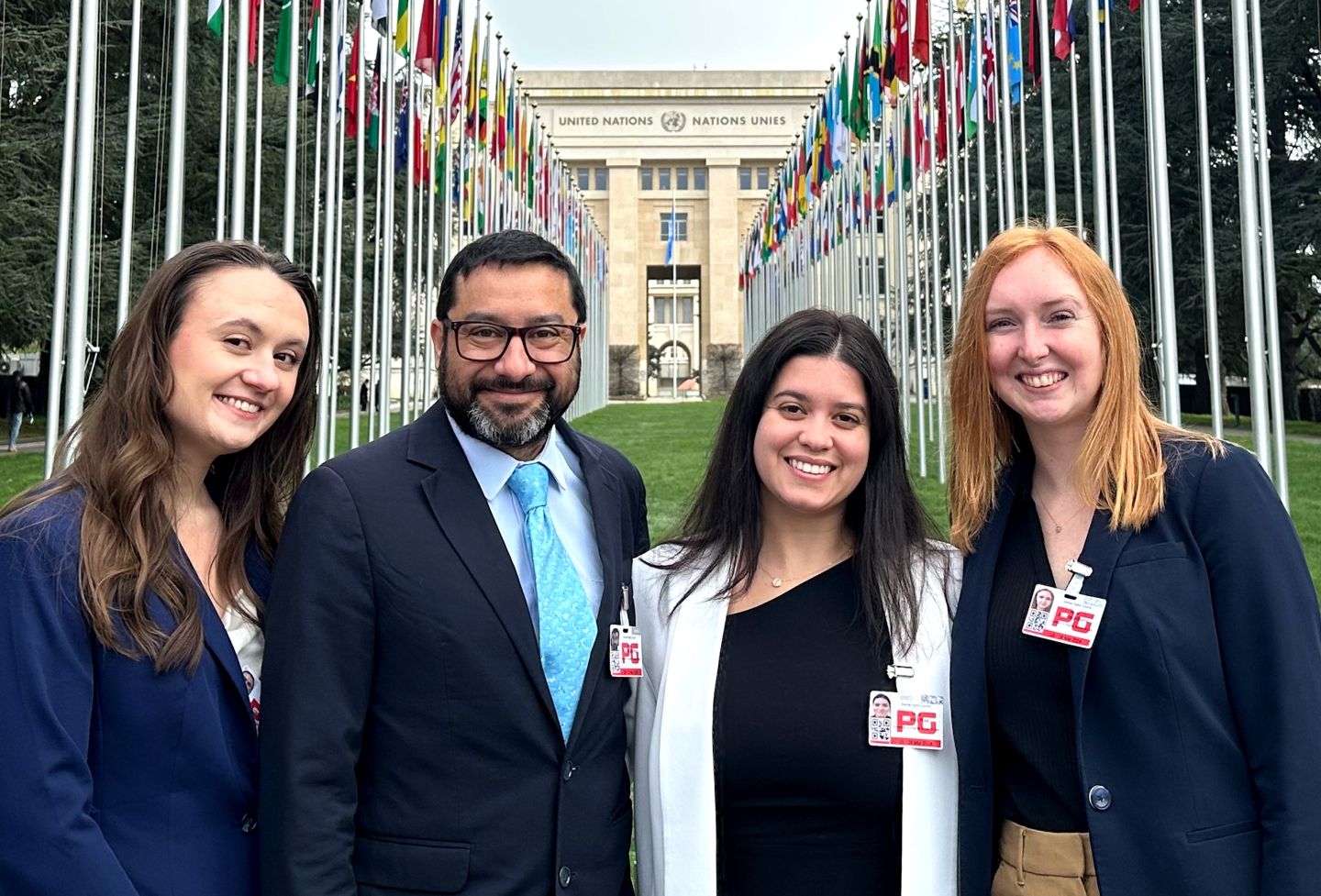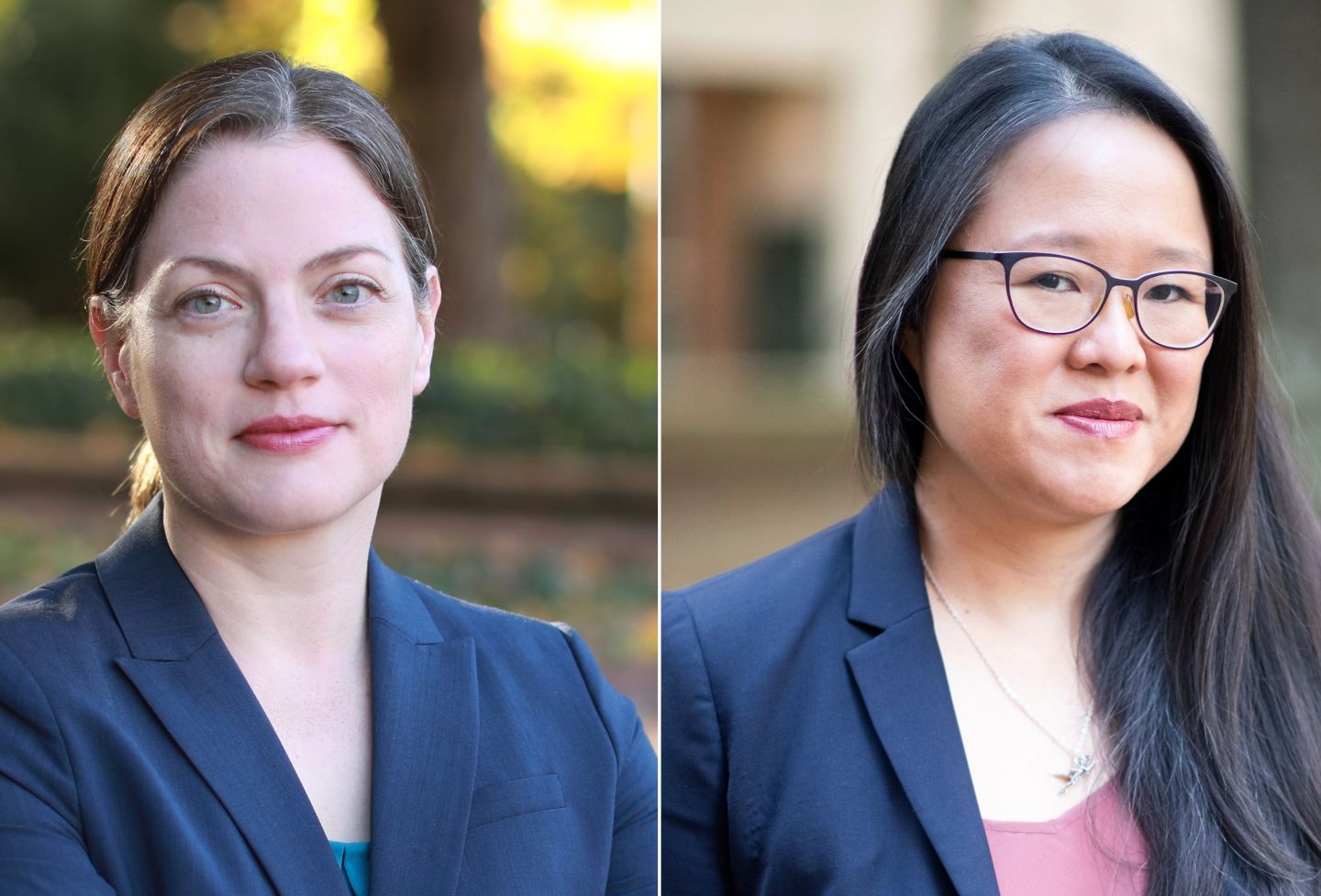Human Rights Attorney Highlights Efforts in Latin America, Caribbean

Attorney and Bernstein Fellow Tara Melish from the Center for Justice and International Law (CEJIL) outlined several legal strategies the human rights organization uses to assist those who wish to being complaints concerning economic, social, and cultural rights (ESCR) violations in the Inter-American Commission and the Inter-American Court of Human Rights. Part exposition on the Inter-American legal system and part lesson on human rights legal strategies, the Sept. 29 session was sponsored by the Human Rights Program, Voz Latina, the J.B. Moore Society of International Law, and the Human Rights Study Project.
Melish, a former Fulbright Scholar who worked in Guatemala on food security strategies, said ESCR issues are a revolutionary area of the law because of the dramatic potential for changing Central America, South America, and the Caribbean.
Melish outlined the legal structure of the Organization of American States (OAS), an international body established in 1948. Under the OAS, the Inter-American Commission, established in 1959, has jurisdiction to hear contentious cases brought by individuals or NGOs on behalf of individuals when state legal avenues have been exhausted. The Commission sometimes refers cases to the Inter-American Court of Human Rights, a panel of seven OAS-appointed judges that began hearing cases in 1987. The guiding instruments for trying human rights cases in the OAS legal system include the OAS Charter, which makes reference to standards or goals in regards to human rights; the American Declaration (1948), which establishes human rights and ESCR but was adopted as a non-binding treaty; and the American Convention on Human Rights (1978), which Melish highlighted as one of the primary tools CEJIL lawyers use. The Convention has three chapters; Chapter 2 contains articles outlining civil and political rights, while Chapter 3 has Article 26, the only provision in the Convention that deals with economic, social, and cultural rights.
Melish said the article was so vague, "it's not hard to understand why this provision hasn't been enforced over the last 15 years." Enforcement of the rights outlined by the Convention has been difficult. The Inter-American Court of Human Rights only has jurisdiction over claims of violations of the American Convention-and only for the 25 (out of 35) OAS states who have ratified the Convention. To better establish ESCR claims, the state parties to the American Convention established the Protocol of San Salvador in 1999, but the only rights protected under the individual petition process include the right to strike and the right to education. The Commission has jurisdiction over all claims of violations of the American Declaration-for those who have not ratified the Convention (and are not subject to the Court).
"After they've ratified, they can no longer be held accountable for a whole subset of human rights" covered by the Declaration, Melish explained. Logically, "those rights must be protected somewhere in the American Convention," she said, which led to what she called "the Article 26 approach."
The Article 26 approach is based on the idea that rights to education, health, and social security are included under that provision. "The argument has never been made to the Court," she said, but it has been made to the Commission. In a recent case before the Commission, the Peruvian government slashed the pensions of workers to one-seventh of what they had previously been paid. CEJIL charged that the government had violated a right to property and a right to judicial protection, to which the Commission agreed, but the body passed over CEJIL's claim of a "right to social security" under Article 26.
A student in the audience questioned Melish over whether judicial mechanisms were the best way to, for example, achieve good health. Melish responded that according to Chapter 1 of the Convention, the state has to respect life-by writing laws that criminalize homicide, for example. "All of the recognized rights in the Convention include Article 26," she said. "If government actors take direct steps to harm somebody's health, then that's going to be a violation of the right to health."
She told the story of an indigenous woman of Chiapas, Mexico, who had gone to the hospital to give birth. With no evidence to support them, doctors claimed the child was retarded and required a Caesarean. She couldn't speak Spanish, and her husband, who could, was forced to leave. "While they had her open … they tied her tubes-without her knowledge or consent," Melish said. The government had forced sterilization of indigenous women in Chiapas because it would be "less mouths to feed and less poverty." Not only was it a violation of the right to health, Melish said, but a violation of the right to privacy and integrity.
Human rights defenders who work in the Inter-American system also wield other legal weapons that are less controversial-what Melish called the indirect approach and the integration approach. Both approaches are strategic, because the Commission and the Court often won't address what is meant by Article 26.
The integration approach is based on the idea that all human rights related to ESCR are also related to civil and political rights, which are defined in chapters 1 and 2 of the Convention. If a prisoner is denied food and he dies, it's a violation of the right to life (Chapter 1) as well as a violation of the right to health. A current case alleges that the government should provide medication for HIV-infected citizens-if the government doesn't provide the medication, it could be a violation of the right to life, she alleged. When the government gives oil-drilling concessions on indigenous lands in Mexico without consulting the community or hasn't properly demarcated the lands to clarify whether the land is state property, it's a violation of the right to property.
Melish called the indirect approach the "easiest" because it is based on violations of procedural norms that protect the legal process, such as the right to due process or the right to judicial protection, defined in Chapter 2 of the Convention. "At the very least the government can't discriminate on who they're going to provide education to," she said. For example, the Dominican Republic had denied children of Haitian descent birth certificates, thus they couldn't be admitted to schools. Under the right to judicial protection, if a state guarantees a right to education in its constitution and doesn't do so for all citizens, it can be argued before the Court using the judicial protection article.
An audience member questioned Melish over how the OAS enforces its decisions.
"I don't think that enforcement should ever temper decisions, but it should temper our idea of what state obligations are," she replied. In the case of the Peruvian pensions, Melish admitted that the pensions probably should have been smaller, but there was no dispute the government broke the law. Peru could have passed a law in advance of the reduction, arguing it was in the public interest to lower pensions, but didn't. Harder questions involve "where an individual is asking for a particular entitlement," she said. While provisions in the Convention such as the right to property might suggest that citizens have a right to minimally adequate housing, "we can't say the government has to provide everybody with a house," she said, adding that we have to define what state obligations are, and take into account the resources of a given country.
"The government has an obligation to create some sort of plan for action" she said. "And then they need to implement that plan and not divert from that plan."
The kinds of cases CEJIL tries before the Commission or Court must be heard through the state's legal system first. "We want to make sure states are protecting rights at the local level," she said. But if there's a lengthy delay or a lack of due process in the country, the Commission can get involved sooner. In Latin countries, nations must decide cases involving fundamental rights within 72 hours. The Commission can be petitioned within six months of the internal resolution, but the petition cannot be submitted to other international bodies. The state has the opportunity to respond to petitions, and the Commission investigates the claim. The Commission "will always try to find some kind of a friendly settlement," she said. In a case decided against the state, the Commission issues an Article 50 report, usually ordering the state to investigate the matter and recommending sanctions and reparations (often in the form of public works).
"What we have found is the state always complies with compensation," she said-but doesn't investigate or sanction government officials involved.
Founded in 1819, the University of Virginia School of Law is the second-oldest continuously operating law school in the nation. Consistently ranked among the top law schools, Virginia is a world-renowned training ground for distinguished lawyers and public servants, instilling in them a commitment to leadership, integrity and community service.


